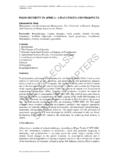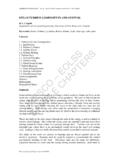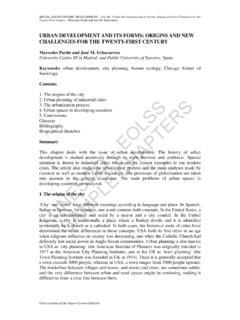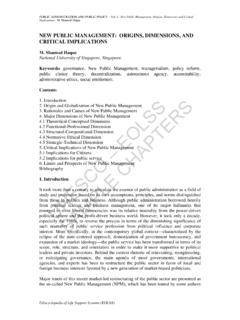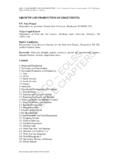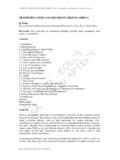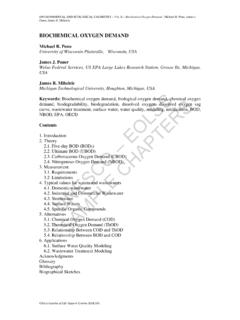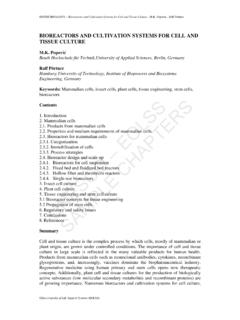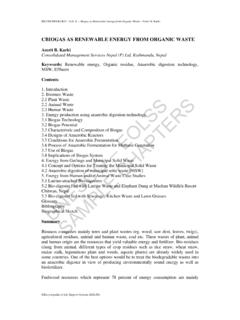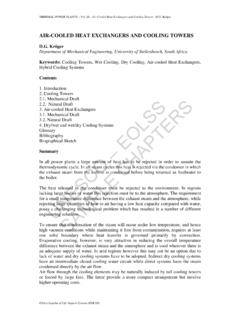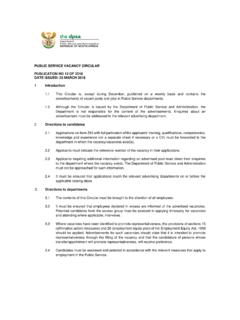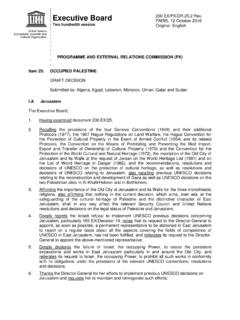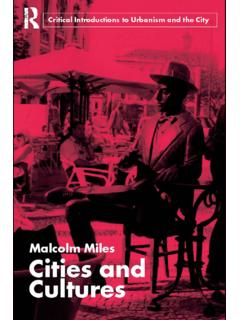Transcription of Social and Cultural Issues in Education
1 unesco EOLSSSAMPLE CHAPTERSEDUCATION FOR SUSTAINABILITY Social and Cultural Issues in Education - T. R. Richardson Encyclopedia of Life Support Systems (EOLSS) Social AND Cultural Issues IN Education T. R. Richardson Associate Professor, Educational Studies, Ball State University, Muncie, Indiana, USA. Keywords: culture, school, Education , curriculum, pedagogy, evaluation, teacher, students, language, literacy, society, nation-state, stratification, colonialism, human ecology Contents 1. Introduction 2. Education as the Transmission of Culture Human Ecology and the Organization of Culture Stratification and Cultural Hierarchies Social Change, Local Cultures, and the Maintenance of Culture Culture, Communication, and Symbolic Meaning 3.
2 Formal Education : The School School Expansion Schooling, Mass Society, and Social Mobility Schooling and Public versus Private Interests 4. Literacy and the Nation-State Literacy as a Quality of Life Indicator Literacy and the Global Economy 5. Potential of Education Systems and the Future Technology as A Product of Education Systems Strength of Weak Ties and the Human Condition Education and the Natural Environment Multicultural Education 6. Conclusion Glossary Bibliography Biographical Sketch Summary This article describes Education as part of the Social environments constructed by humanity to transfer culture from one generation to the next.
3 Schooling is a formal aspect of this educational process, which in contemporary times is associated with modernization, and the accompanying phenomena of industrialization, urbanization, and demographic change. Schools reflect the culture and the status quo of the society s which they are in. They also reproduce the relations of power and privilege of dominant groups in society, while also providing a safety valve by offering various degrees of Social mobility to the majority population. The literacy and modern knowledge fostered by formal schooling is seen as a vital aspect of modernization, development and growth, and a key in the elimination of economic unevenness among nations.
4 The detrimental impact of modern civilization on the environment is recognized as a fundamental global issue facing humanity. While Education alone is incapable of resolving global unesco EOLSSSAMPLE CHAPTERSEDUCATION FOR SUSTAINABILITY Social and Cultural Issues in Education - T. R. Richardson Encyclopedia of Life Support Systems (EOLSS) environmental Issues , it is an inescapable tool in the advancement of technological skills, literacy skills, and in the promotion of global understanding for a more sustainable future. In conclusion, the article suggests that rather than pursue the pressure for close ties and a single world view, loose coupling the strengthening of weak ties through networks of mutual interest and multicultural Education are the directions to consider in advancing the concept of sustainability in the next millennium.
5 1. Introduction Human beings separate themselves from their natural condition by creating their own Social and physical environments. The ecological relationship between human beings and the natural environment changes over time through human activity where survival and procreation require specialized habitats in response to climatic and other conditions such as the availability of food, water, and other resources. Accumulated knowledge on how to survive in specific contexts is organized over time as patterns of distinctive beliefs and behaviors that form a culture. This blueprint for survival must be handed down to future generations, and all human societies have developed mechanisms for this to take place.
6 The survival of humanity inherently contributes to environmental changes however, which have both intended and unintended consequences. During the last half of the twentieth century the relationship between the sustainability of the natural environment and human survival and habitation has reached crisis proportions. This article examines the sustainability crisis in terms of Education as the transmission of culture and the role of schools as a primary organizing factor in modern and postmodern societies. The creation of systems of formal Education is a major tool in the modernization process for developing countries.
7 A distinction is made here between Education and schooling. Education is the larger concept of the transmission of all forms of knowledge from birth to death which characterize all societies. Schooling refers to the formal transmission of specific knowledge called curriculum in a special place called a school where individuals in specialized roles exchange knowledge with a designated teacher, or teachers, and students. Knowledge acquisition is measured, evaluated, and compared according to established standards. The role of schools in modernization and in response to changing definitions of literacy is viewed in relation to the nation-state.
8 Schooling can be organized, and is usually intended, to foster personal and Social progress. Education systems are conservative institutions and are used for reproduction and Social control which encourages conformity and dependence on established powers either within a society or nation or among societies and nations. The objective is to explore ways to better understand the relationship between Social forces and natural environments. Since most human beings are not educated to look beyond their immediate situation, people tend to experience nature, history, and society through the lens of biography and their own culture.
9 The perspective which needs to be fostered for a more universal outlook is one that links personal problems to public Issues on a global scale. There are two suppositions: first, individuals can take control over their own lives by becoming aware of the dynamics of their own positions within the Social and natural order; secondly, by developing an awareness of all of those individuals in similar circumstances, progress can be made toward global understanding and tolerance as people learn to act in their common interests. This article concludes unesco EOLSSSAMPLE CHAPTERSEDUCATION FOR SUSTAINABILITY Social and Cultural Issues in Education - T.
10 R. Richardson Encyclopedia of Life Support Systems (EOLSS) with a discussion of schooling for the heterogeneous societies of the future where weak ties may be the bonds that foster the possibility of educating all peoples for citizenship in a human community of diverse, sustainable and co-existent cultures. 2. Education as the Transmission of Culture A culture is the worldview and way of life of a group of people. It encompasses their material world, including how they live, what they wear, their technologies, and all of the tangible objects and structures that define their community. It also includes the intangible aspects of the Social and intellectual heritage of a people in their beliefs, values, and behaviors.
